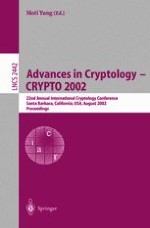2002 | OriginalPaper | Buchkapitel
Perfect Hiding and Perfect Binding Universally Composable Commitment Schemes with Constant Expansion Factor
verfasst von : Ivan Damgård, Jesper Buus Nielsen
Erschienen in: Advances in Cryptology — CRYPTO 2002
Verlag: Springer Berlin Heidelberg
Enthalten in: Professional Book Archive
Aktivieren Sie unsere intelligente Suche, um passende Fachinhalte oder Patente zu finden.
Wählen Sie Textabschnitte aus um mit Künstlicher Intelligenz passenden Patente zu finden. powered by
Markieren Sie Textabschnitte, um KI-gestützt weitere passende Inhalte zu finden. powered by
Canetti and Fischlin have recently proposed the security notion universal composability for commitment schemes and provided two examples. This new notion is very strong. It guarantees that security is maintained even when an unbounded number of copies of the scheme are running concurrently, also it guarantees non-malleability and security against adaptive adversaries. Both proposed schemes use Θ(k) bits to commit to one bit and can be based on the existence of trapdoor commitments and non-malleable encryption.We present new universally composable commitment (UCC) schemes based on extractable q one-way homomorphisms. These in turn exist based on the Paillier cryptosystem, the Okamoto-Uchiyama cryptosystem, or the DDH assumption. The schemes are efficient: to commit to k bits, they use a constant number of modular exponentiations and communicates O(k) bits. Furthermore the scheme can be instantiated in either perfectly hiding or perfectly binding versions. These are the first schemes to show that constant expansion factor, perfect hiding, and perfect binding can be obtained for universally composable commitments.We also show how the schemes can be applied to do efficient zeroknowledge proofs of knowledge that are universally composable.
